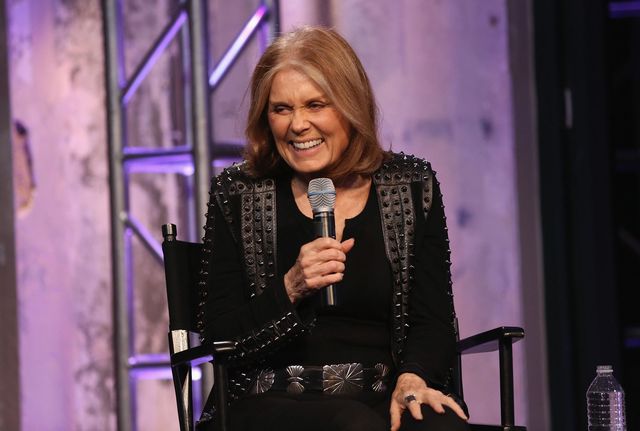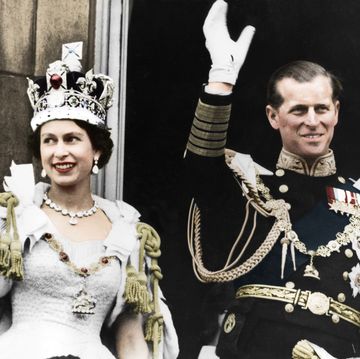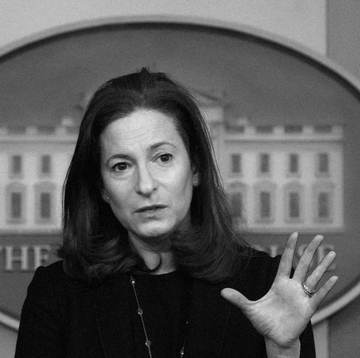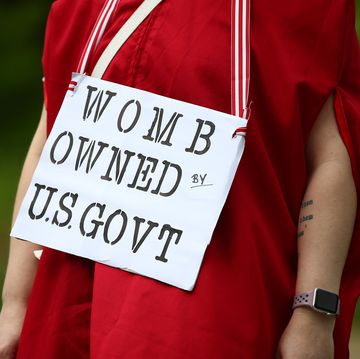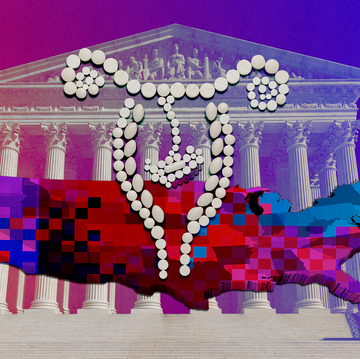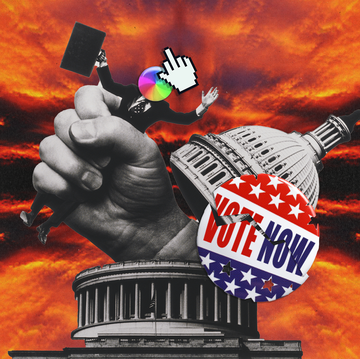Our feminist foremother has misbehaved. Gloria Steinem said young women only support Bernie Sanders because they want attention from boys. Can you believe it?
Don't, because it's not true. Despite media panting over feminist icons "scolding" young women, as the New York Times put it, and telling Sanders supporters "shame on you" (the Times, again), it's not exactly the case that two batty old nags set out to wag their fingers at the sprightly young Bernie Babes. And those kinds of inaccurate, divisive characterizations do a disservice to honest political discourse about gender, feminism, and electoral politics.
Far from jumping on her soapbox to trash "kids today," Steinem actually went on Bill Maher's show last Friday to promote her new book, My Life on the Road, and had a bunch of good things to say about young women and feminism.
"I find the young women very activist and they're way more feminist," Steinem said. "We were, like, 12 crazy ladies in the beginning, and now it's the majority. I do think that gratitude never radicalized anybody. I did not say thank you for the vote. I got mad on the basis of what was happening to me, and I think that that's true of young women too. So they're mad as hell because they're graduating in debt, and they're gonna earn a million dollars less over their lifetime to pay it back, they're mad about what's happening to them."
Then Maher pressed her on Sanders versus Clinton, saying that young women "really don't like Hillary." Steinem responded that overall, women and African-American voters strongly support Clinton, and that, unlike men, "women get more radical as we get older."
"Men tend to get more conservative because they gain power as they age, and women tend to get more radical because they lose power as they age," Steinem said. "It's not fair to measure most women by the standard of most men, because they're gonna get more activist as they grow older, and when you're young, you're thinking, Where are the boys, the boys are with Bernie."
It's that last admittedly awkward line that got Steinem in hot water. Steinem "suggested younger women were just backing Mr. Sanders so that they could meet young men," alleged the Times. According to Politico, "Feminist icon Gloria Steinem said that young women are supporting Bernie Sanders because they're looking for boys."
One group of Sanders supporters even launched a petition against her, petulantly demanding that Steinem issue a mea culpa — "we demand that you admit your mistake and apologize" were the exact words in the petition, a phrasing more appropriately leveled at a naughty student by a disciplinarian headmaster than at an adult woman who is a long-time political activist and surely doesn't need to be sneeringly admonished.
The swift backlash did indeed garner an apology from Steinem. But the actual point remains lost: Not that young women only support Sanders because they want to impress boys, but that, especially among the young, "guy stuff" is cool and enviable, whereas "girl stuff" is lame, uncool, and, well, girly. In this primary, Sanders is the guy stuff. Clinton is the girl stuff.
Despite the fact that the United States is a more gender-egalitarian place than ever before, "guy stuff" remains much more socially vaunted than "girl stuff." There are hundreds of examples, large and small: It's trendy to name your daughter a traditionally masculine name but you don't find a lot of boys given girls' names, and as soon as a name crosses over to be largely female, you almost never see it attached to a boy again (Lindsay, Ashley, Taylor); women wear pants and suits and all manner of male clothing while men wearing skirts or dresses remains an anomaly; it's respected when women enter traditionally male-dominated careers and become doctors, electricians, lawyers, or professional sports coaches, but men who become nurses or secretaries enjoy no such admiration; and as professional fields become female-dominated, they lose both pay and prestige.
Being a Gone-Girl-esque Cool Girl, other feminist-minded writers have noted, is a phase a lot of us go through — for many young women, it's part of finding your identity. It's not so much that you make up a set of interests or feelings as it is that you more fully broadcast the ones that are guy-approved — and "guy-approved" ends up meaning "cool." "I just mostly have guy friends!" is a thing you hear a lot from young women, usually with a smile and a shrug, and almost always as a status marker — she's cool, she hangs out with the guys.
That isn't to say that plenty of women don't genuinely like whiskey and football and hotdogs and video games. It isn't to say that the women who say they like those things are faking it to impress boys. It is to say that there is a whole assortment of social benefits that comes along with liking guy things, as long as you maintain appropriately feminine levels of deference and physical attractiveness.
Similarly, this isn't to say that plenty of young women don't like Bernie Sanders for his policy positions, his revolutionary message, and his far-left politics. They do. Young women aren't dumb, and they aren't pledging allegiance to Sanders just to get the boys. But especially for young women, there are social benefits to supporting Sanders — the Guy Thing, the cool thing — that don't come with supporting Clinton. It's difficult to discuss the nuances of cultural misogyny without sounding like you're saying young women don't know their own minds, but the "cool" dynamic isn't relegated to young women. Every voter is influenced by factors other than policy positions — whether that's perceptions of strength, radicalism, relatability, authenticity, who you'd want to have a beer with, whose face or voice just bugs you, whose candidacy would be historical. Those factors are distributed among the candidates unevenly and some matter more than others, but certainly, for young Democrats, coolness is a key factor in support and turnout — just ask Barack Obama.
To be clear, there's nothing inherently suspect about being cool. Hillary Clinton had a moment of coolness too, when she was secretary of state — recall the Texts from Hillary Clinton Tumblr, and the meme of her with the dark sunglasses on, looking her Blackberry like a boss. That cool factor receded, though, as soon as she was running for president. As political writer Rebecca Traister has pointed out, powerful women can be cool, but women get markedly less cool when they're competing for power against a man.
College-age women, even those who vacillate between Clinton and Sanders, agree that Sanders is the cool candidate to support on campus — and that it's particularly uncool to take into account the fact that Clinton is a woman, even though electing a woman to the White House for the first time in 200 years would be, by any measure, a pretty significant (some might even say progressive or revolutionary) achievement. Aubrey Schefft, a senior at Hiram College in Ohio, told Cosmopolitan.com that even on her conservative campus, "Sanders is definitely way cooler." She herself went to a Sanders rally, but now she supports Clinton, although she also takes issue with what Steinem said about young women. "I have a lot of friends who are 'Bernie Bros,'" Schefft said in an email. "They not only push me hard to support Sanders but seem to make a lot of arguments that I support Clinton merely because I am a woman."
"I would say that Bernie is considered cooler on campus, because people see him as someone who operates outside of 'the system,' while Hillary is more establishment," said Kiley Delaney, a sophomore at liberal Macalester College, in an email. Lydia Paulos, an NYU student, said in an email that she's "definitely felt a lot of pressure to support Bernie." "Every post on Facebook and Twitter I've seen from my peers about politics has been to support Bernie — or to bash Hillary," she said.
The generational divide in support for Bernie Sanders versus Hillary Clinton is more pronounced in the homogenous, almost-entirely-white states dominating news coverage of the early primaries — i.e., Iowa and New Hampshire. Nationally, Sanders's youth vote shrinks, in large part because of African-American and Hispanic voters, who are strongly pro-Clinton. In Iowa, Sanders swept the under-30s, with 84 percent of them voting for him, and secured 58 percent of the under-45s. But national polls continue to tell a different story: Clinton is ahead among voters 18 to 45, with 48 percent of them supporting her in the primary versus 39 percent for Sanders and 13 percent undecided (an important caveat: No reliable, recent national polls I could find specified the preferences of under-30s, and neither poll linked here cross-references age and gender in the breakdown). And among African-Americans nationally, Clinton has whopping 82 percent support, compared to Sanders's 8 percent. Among Hispanic voters, it's 48 percent to 36, advantage Clinton.
"The kids-love-Bernie narrative is based almost entirely on polls from very white states, with small sample sizes with huge margins of error," Nancy Cohen, an historian and author of Breakthrough: The Making of America's First Woman President, told Cosmopolitan.com in an email. "Forty percent of Millennials nationally are nonwhite. I expect to see Clinton do well when the race moves to diverse states that look more like the Democratic Party."
It's important to have conversations about why voters are attracted to their candidates of choice, and those conversations have to go deeper than "I like who I like." They have to go deeper, even, than policy positions, which explain only a fraction of political successes. That means we have to analyze the myriad ways gender influences our electoral decisions — in our perceptions of candidates, in who is permitted to be loud or revolutionary, in who manages to capture the support of various demographics and what that says. And we should be capable of having those conversations even when they're entered into ham-fistedly, as with Steinem's comment, instead of giving challenging commentary the least-generous reading and then demanding apologies.
Bernie Sanders and Gloria Steinem are from the same generation. They're both revolutionaries, Sanders working as an independent within the political system for 35 years to promote income equality, and Steinem rabble-rousing, advocating, and organizing for 50 years to promote women's rights around the world. How telling, then, to see reactions to them from the left: Sanders draws large crowds and a youthful base energized by his ideals, even as many of his policy proposals are light on specifics, because he's a cool old guy. Steinem says something challenging that adoration, and there's one response: Shut up, old lady.
Follow Jill on Twitter.

Jill Filipovic is a contributing writer for cosmopolitan.com. She is the author of OK Boomer, Let's Talk: How My Generation Got Left Behind and The H-Spot: The Feminist Pursuit of Happiness. A weekly CNN columnist and a contributing writer for the New York Times, she is also a lawyer.
